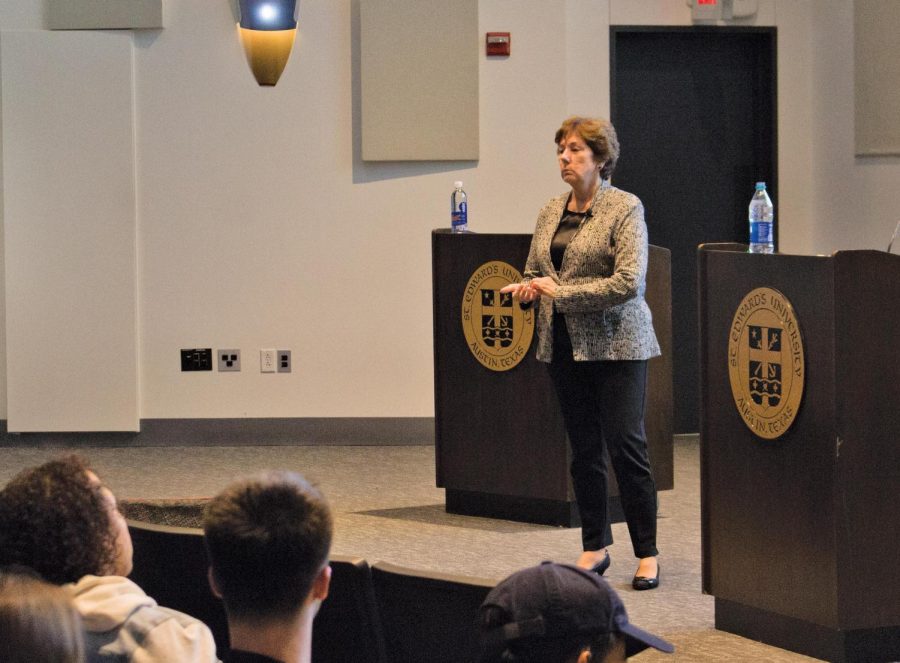Former general offers explanation, theory for misinformation in the media
Eder speaks to students about her theory of an “information apocalypse” as it relates to how news is spread. The event was held in Jones Auditorium in Ragsdale Center.
The Kozmetsky Center of Excellence hosted a talk with US Army Major General (Ret.) Mari K. Eder. Eder’s presentation, titled “Information Apocalypse: Issues of Reliability and Manipulation of the Public Information Space on Institutions and Leadership,” on Oct. 30. The event centered around the increasing difficulty in our current society to distinguish what information is reliable and what is not.
Eder gave her perspective on the media and information influencing perceptions of institutions, public leaders and elections. She discussed how policy makers can help respond to challenges in obtaining credible information, which can stop people from being influenced by false information.
She began the talk with the reason why she calls the information age the “information apocalypse.” Eder provided studies that showed a “37% global decrease in trust in institutions.”
Eder continued with giving her perspective of why the world has a decreasing trust in institutions today.
“I think we are at this crossroads where we no longer depend upon information coming to us in a way that has been filtered,” Eder said. “What has been influencing us is the celebrity-soaked culture we live in. This has been going on for the last 20 years.”
Eder said there’s more power being weiled by influencers today, citing the example of Snapchat’s stock value decreasing rapidly when Kyile Jenner said she doesn’t use it.
Eder also discussed how the media has become a place for more than just journalists and editors.
“Those people that define media not only as that of reporters, editors and publishers, but also platforms. Because it’s platforms now that are publishing content, repeating content. Media is now this giant blob of information that seems to be unsorted.” Eder said.
The illusion of choice was another topic that Eder highlighted in her presentation. She talks about the five major companies that own a large majority of the media and how these companies have a large influence on us.
“In these companies, there are 232 executives that make decisions about what we see. That influences 90% of all the information that Americans see, think and hear or think is even more important.”
Eder gave her thoughts on why there’s so much misinformation in the world, specifically with the news.
“I think misinformation comes from condensing,” she said. “In journalism, as you try to make a story shorter, you lose detail, you lose bits of truth. You lose relevance… when you’re left with only the first paragraph, which is the summary, you don’t have anything else that helps you with understanding. I think that’s what we’re missing.”
On the discussion about news organizations and which sides some take, she said that understanding both sides is important in understanding how they judge situations each time.
“I think it’s always important to see both sides. It’s even more important to be able to understand how both sides see themselves. So if you understand where they’re coming from, then you can appreciate how they look at a situation and how they judge it every time,” Eder said.







